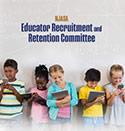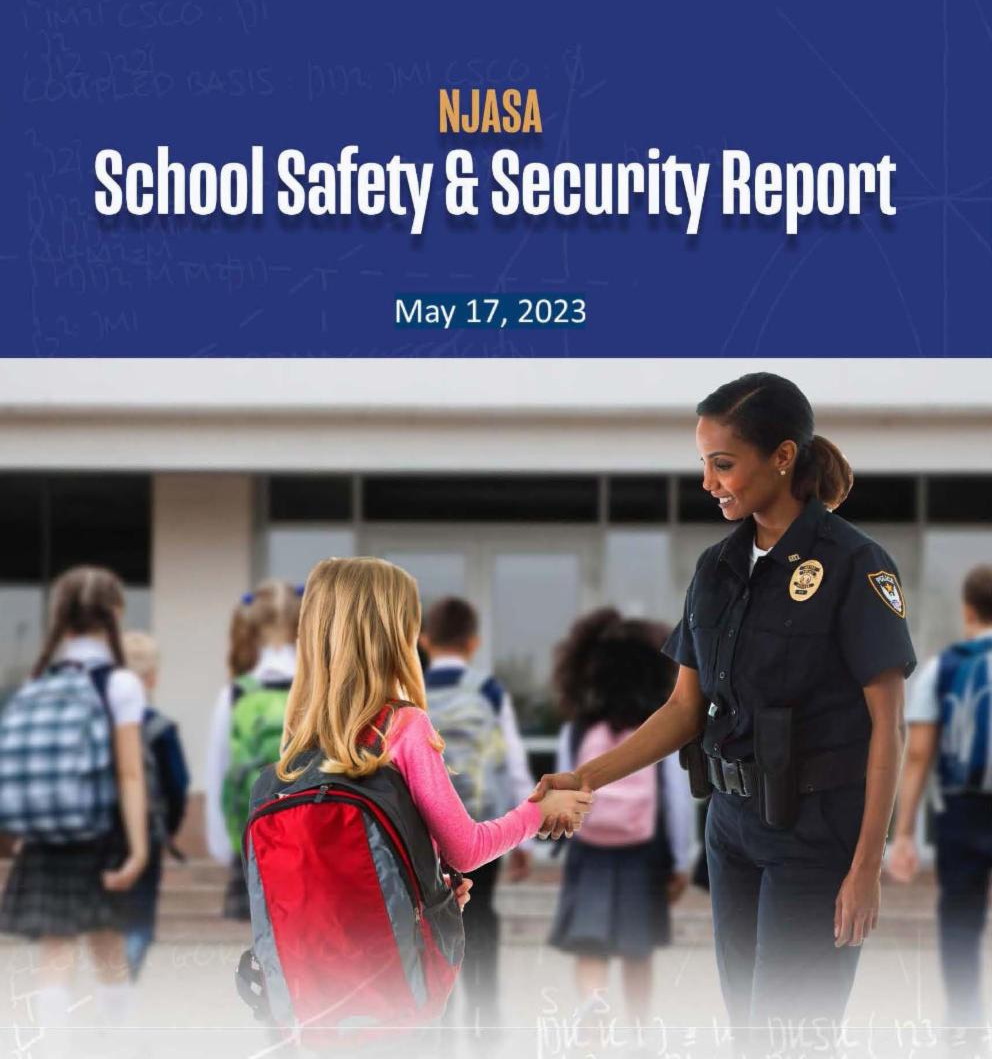- NJASA
- Executive View Sept. 23 FINAL
-
How New Jersey Educators Are Addressing the
Burning Issues of the New School Year
Adam Clark of Advance Media for nj.com recently delved into the crucial issues poised to define New Jersey's new school year in his compelling article, "5 Burning Questions that Will Define N.J.'s New School Year." In this thought-provoking piece, drawing from perspectives shared by two Chief Education Officers, the director of the Eagleton Center for Public Interest Polling, and the spokesperson for the New Jersey Education Association, Clark underscores enduring challenges in public education and spotlights issues that have confronted New Jersey schools throughout the pandemic and beyond. Let’s examine each of the five critical areas and the collaborative strategies that New Jersey educators employ to address these pressing questions.Q1 - What happens when the teacher shortage gets worse?
 The shortage of educators in New Jersey is a pressing issue that demands immediate attention. An NJASA task force led by Dr. David Aderhold, Chief Education Officer of the West-Windsor/Plainsboro Public Schools, and Dr. Suzanne McCotter, Dean of the School of Education at the College of New Jersey, released a comprehensive report earlier this year, along with a range of recommendations aimed at addressing this critical challenge. While some of these recommendations have found their way into legislative actions, there remains much work to be done. Advocating for competitive compensation packages and improved working conditions should be at the forefront of our efforts. Additionally, forging partnerships with local colleges and universities to develop teacher preparation programs tailored to New Jersey's unique needs is paramount. To bolster our educator workforce, we should also proactively mentor and support aspiring educators from as early as middle school, nurturing their interest in joining the profession. Removing recruitment obstacles through administrative and legislative actions continues to be a focus. Reinstating the Teacher of General Science and Teacher of the Handicapped endorsement for example can provide flexibility in instructor assignment and scheduling to meet student needs.
The shortage of educators in New Jersey is a pressing issue that demands immediate attention. An NJASA task force led by Dr. David Aderhold, Chief Education Officer of the West-Windsor/Plainsboro Public Schools, and Dr. Suzanne McCotter, Dean of the School of Education at the College of New Jersey, released a comprehensive report earlier this year, along with a range of recommendations aimed at addressing this critical challenge. While some of these recommendations have found their way into legislative actions, there remains much work to be done. Advocating for competitive compensation packages and improved working conditions should be at the forefront of our efforts. Additionally, forging partnerships with local colleges and universities to develop teacher preparation programs tailored to New Jersey's unique needs is paramount. To bolster our educator workforce, we should also proactively mentor and support aspiring educators from as early as middle school, nurturing their interest in joining the profession. Removing recruitment obstacles through administrative and legislative actions continues to be a focus. Reinstating the Teacher of General Science and Teacher of the Handicapped endorsement for example can provide flexibility in instructor assignment and scheduling to meet student needs.
Q2 - How much uglier will the culture wars get?In the complex landscape of education culture wars, New Jersey educators are rising to the challenge with a proactive approach that keeps the focus on quality education while addressing contentious issues constructively. Here's how they are navigating this terrain:
Open Dialogue and Transparency: New Jersey educators are creating opportunities for open dialogue with parents, community members, and school boards. They're making sure parents feel heard, addressing concerns transparently, and regularly communicating about curriculum decisions to build trust and reduce misunderstandings.Education and Information Sharing: To combat misinformation, educators are providing parents with accurate information about school curriculum. They're actively dispelling myths and explaining the curriculum while sharing resources and reading materials to help parents understand educational content, especially on sensitive topics like sex education and LGBTQ+ issues.
Professional Development: Investment in professional development is equipping educators with the skills and knowledge to thoughtfully address controversial topics. Training also focuses on creating inclusive and respectful classroom environments that celebrate diversity.
Community Engagement: Community events, workshops, and forums serve as platforms for constructive conversations and dispelling misconceptions. Collaborations with local organizations and leaders are bridging gaps and promoting understanding within the community.
Legal and Policy Support: Educators ensure they are well-versed in local and state laws related to curriculum and parental rights. They advocate for policies that protect educator autonomy while respecting parental rights and concerns.
Media Literacy Education: Media literacy is now integrated into the curriculum, helping students critically analyze news sources and navigate information effectively, indirectly addressing some of the issues fueling culture wars.
Strengthening Relationships: Despite external pressures, educators continue to prioritize strong relationships with parents, finding common ground and emphasizing shared goals, such as student well-being and education. They highlight the positive contributions of parents and community members to the educational process.
Political Awareness and Advocacy: Educators stay informed about political developments impacting education, engage with elected officials, and advocate for policies that support a balanced and inclusive curriculum.
Resilience and Focus: While addressing culture wars can be emotionally draining, educators understand the importance of maintaining a focus on quality education. They encourage mutual support among colleagues and prioritize self-care to remain resilient in the face of challenges.
While the culture wars may persist, New Jersey educators are committed to playing a pivotal role in promoting constructive discussions and ensuring that the primary focus remains on the well-being and education of all students.
Q3 - Are students making up enough ground from COVID-era learning loss?In New Jersey, educators are facing the critical challenge of addressing learning loss, and they're taking a multifaceted approach to help students get back on track.
First, they're creating Personalized Learning Plans (PLPs) tailored to each student's unique needs. These plans pinpoint areas of weakness and outline targeted interventions, with input from specialized educators, counselors, and support staff.
Educators are also forming collaborative teacher teams within schools and districts. Through professional learning communities (PLCs) and workshops, they're sharing successful teaching strategies, exchanging ideas, and learning from each other's experiences.
To provide additional support for students, they're expanding after-school programs, enrichment activities, and extended learning opportunities. These initiatives are designed to target specific academic needs, offering tutoring, homework assistance, and engaging educational activities.
Maintaining open and proactive communication with parents is another key aspect. Educators keep parents informed about their child's progress and areas of improvement, organizing parent-teacher conferences, workshops, and information sessions to involve parents in the learning process.
Data-driven assessments are being used to monitor students' progress continuously and identify areas where additional support is needed. The results guide decisions about adjusting teaching methods, modifying curriculum, or offering targeted interventions.
Mentoring and peer support play a vital role in helping struggling students. They're paired with mentors or tutors who provide one-on-one assistance and encouragement, fostering a sense of responsibility and leadership within the school community.
To prevent further learning loss during extended breaks, educators are developing and promoting summer learning programs. These programs focus on both academic enrichment and recreational activities, allowing students to catch up on missed content.
Collaborating with local community organizations, libraries, and businesses is another strategy. These partnerships provide resources and expertise to support student learning, creating a network of support that extends beyond the school walls.
Flexible teaching strategies and differentiation techniques are embraced in the classroom. Educators adapt instruction to students' skill levels and learning styles, ensuring that no one is left behind.
New Jersey educators invest in ongoing professional development, focusing on addressing learning loss and supporting struggling students. They stay up to date with research-based methods and tools to effectively remediate and accelerate learning.
By adopting these comprehensive strategies, New Jersey educators are making substantial progress in addressing learning loss, ensuring that every student can reach their full potential. This collaborative effort is not only bridging learning gaps but also strengthening the overall education system in the state.
Q4 - Are schools better prepared to tackle the mental health crisis? Prioritizing students' mental health is of utmost importance. Prominent figures like NJASA Past President Tony Trongone and leaders of other state organizations are actively involved in the New Jersey Statewide Student Support Services (NJ4S) Advisory Taskforce, providing practical input from the field on expanded student mental health services. Many county associations are doing exemplary work in this area. The Monmouth County Schools Partnership for Wellness (MCSPW) provides one example.
Prioritizing students' mental health is of utmost importance. Prominent figures like NJASA Past President Tony Trongone and leaders of other state organizations are actively involved in the New Jersey Statewide Student Support Services (NJ4S) Advisory Taskforce, providing practical input from the field on expanded student mental health services. Many county associations are doing exemplary work in this area. The Monmouth County Schools Partnership for Wellness (MCSPW) provides one example. As educators in New Jersey, we foster supportive and empathetic classroom environments. Training to recognize signs of distress and connecting students with available mental health resources is crucial. Promoting the new mental health support centers in New Jersey's schools and communities is an opportunity to help students access the assistance they need.
Q5 - Will a new school safety initiative work? NJASA leaders across the state acknowledge the ongoing challenge of maintaining secure and safe school environments. Chief Education Officers Dr. Mary Jane Garibay (Colts Neck Schools) and Dr. Charles Sampson (Freehold Regional Schools) led a task force that explored school safety and student security, issuing a report with recommendations earlier this year. Many of these recommendations are now part of New Jersey legislative proposals. As educators, we must actively participate in the state's latest school safety initiatives. This includes organizing newly required threat assessment teams and ensuring their preparedness in identifying and addressing potential risks. By nurturing a positive school culture that values empathy and conflict resolution, we can contribute to safer learning environments. Regular training exercises and drills tailored to New Jersey's unique needs are essential for preparedness.
NJASA leaders across the state acknowledge the ongoing challenge of maintaining secure and safe school environments. Chief Education Officers Dr. Mary Jane Garibay (Colts Neck Schools) and Dr. Charles Sampson (Freehold Regional Schools) led a task force that explored school safety and student security, issuing a report with recommendations earlier this year. Many of these recommendations are now part of New Jersey legislative proposals. As educators, we must actively participate in the state's latest school safety initiatives. This includes organizing newly required threat assessment teams and ensuring their preparedness in identifying and addressing potential risks. By nurturing a positive school culture that values empathy and conflict resolution, we can contribute to safer learning environments. Regular training exercises and drills tailored to New Jersey's unique needs are essential for preparedness.In summary, as educators in New Jersey, we hold a unique position in addressing these challenges within our state. Through collaboration, advocacy, and an unwavering commitment to the well-being and education of our students, we can wield a significant impact and ensure the success of New Jersey's education system. Together, we can navigate these burning questions and pave the way for a brighter educational future in the Garden State.



